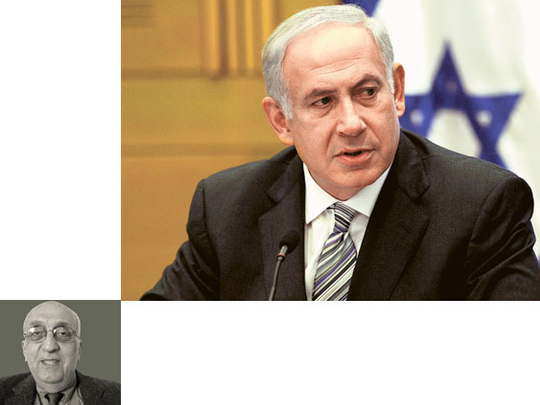
What has been puzzling in the wake of US Secretary of State John Kerry’s seemingly successful recent talks with Palestinian and Israeli leaders has been the failure of Tel Aviv to be on the same page. This fact casts doubt on Israel’s sincerity and, more drastically, on the chances of a Palestinian-Israeli settlement.
Here is what the Palestinian President, Mahmoud Abbas, had to say after Kerry reported upon his departure from the Middle East that there was “real progress” in his meetings with the two leaders. Abbas said he was optimistic that Kerry would succeed in restarting Palestinian-Israeli peace talks, a view that the Associated Press observed was “a rare upbeat assessment about American mediation efforts”. He told a news conference that Kerry presented “useful and constructive suggestions” and promised to return to the region soon.
In turn, Israeli Prime Minister Benjamin Netanyahu told his visiting Italian counterpart earlier this week that he wanted peace, stressing that he was ready “to restart peace negotiations as soon as possible, without any obstacles”. He added that he was ready to sit in the “peace tent” with the Palestinian leader until “white smoke comes out”.
All this sounds nice and dandy, but here is the vision of another key member of Netanyahu’s cabinet and his Likud Party, Danny Danon, the Deputy Defence Minister, who is described as “a soft-spoken lawmaker with a penchant for sharp suits”. Danon declared: “I think the prime minister knows that if he is presenting the ideology of the Likud Party we all support him.” However, he warned if the leader decides to go in the other direction (with Palestinians) then “there will be changes within the Likud”. He did not spell out these changes, but presumably the party will splinter or Netanyahu will quit the group.
The 42-year-old Danon, known to be among a group of young Likudnik hardliners, rose to prominence during a Likud primary vote last year. Members of the group reportedly include Deputy Foreign Minister Zeev Elkin, Knesset Speaker Yuli Edelstein, Deputy Transport Minister Tzipi Hotovely and coalition whip, Yaris Levin — all oppose the establishment of a Palestinian state and all are proponents of building colonies in Israeli-occupied West Bank and occupied East Jerusalem. Moreover, Danon has been overwhelmingly elected head of the Likud convention with 86 per cent of the votes and scored another landslide victory on Sunday when he became chairman of the Likud Central Committee.
One wonders why Netanyahu, if he truly supports a peace settlement, will want to keep Danon on his team, unless of course he has other intentions. Even his chief peace negotiator, Justice Minister Tzipi Livni, has called on the prime minister to reject “Danonism”. The chief Palestinian negotiator, Saeb Erekat, had also accused Danon of killing the prospect of peace.
What has been equally appalling is a front-page report in the New York Times on July 2 revealing that Kerry’s “exertions” in the Middle East “have been met in Washington with the usual mix of hope and scepticism ... raising questions about the Barack Obama administration’s priorities at a time of [Arab] unrest”.
The paper, which has always referred to the Israeli-occupied West Bank as “disputed” territories, maintained that “the Israeli-Palestinian conflict, once a stark symbol and source of grievance in the Arab world, is now almost a sideshow in a Middle East, consumed by sectarian strife, economic misery and, in Egypt, a democratically elected leader fighting legitimacy with many of his people.”
The paper argued: “[US] Administration officials no longer argue, as they did early in President Obama’s first term, that ending the Israeli occupation and creating a Palestinian state is the key to improving the standing of the United States in the Middle East. The Israeli-Palestinian conflict is now just one headache among a multitude.”
According to the Times, unnamed “analysts said the gravity of the crisis in Egypt would force [Kerry] and other senior officials to shift their attention to Cairo, where American policy, some say, has failed to keep up with events”.
It is noteworthy that Obama has yet to applaud Kerry’s shuttle diplomacy between the Palestinian and Israeli leaders, where one session with Netanyahu lasted until 4am.
A point that is worthy of serious US consideration is the results of a recent survey of 20,000 people in 14 countries by the Arab Centre for Research and Policy Studies in Doha. The survey found that Israel and the US were seen as the top security threats. However, here, Kerry ought to be recognised for his recent successful effort to enlist the Arab world in his campaign to bring peace to Palestine and Israel as when he convinced Arab leaders to sweeten to the Israeli government, the Arab Peace Initiative after a meeting of Arab foreign ministers in Washington recently. In other words, the Arab governments’ promise to establish ties with Israel, once a Palestinian-Israeli peace agreement is ratified.
George S.Hishmeh is a Washington-based columnist. He can be contacted at ghishmeh@gulfnews.com.









